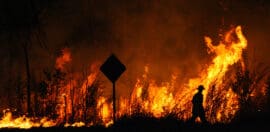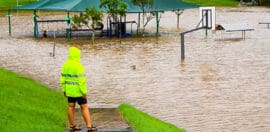Children and young people must be part of the solution to climate change

22 August 2022 at 11:32 am
We know that children and young people are experts on the matters affecting them, and should be consulted as such, writes Deb Tsorbaris.
There was a palpable sense of relief when earlier this month the Climate Change Bill passed through the House of Representatives, taking Australia one step closer to becoming legally bound to reducing greenhouse emissions by 43 per cent on 2005 levels by 2030.
It is overdue. In Australia, rising temperatures have fuelled forest fires that are record-breaking in both scale and intensity, while extreme weather events have triggered flooding, cyclones and drought across Australia and abroad. The Great Barrier Reef, Australia’s prized ecological wonder, is experiencing its fourth mass bleaching event since 2016, with much of the reef expected to be dead by 2032.
All the while, Australia’s underwhelming climate policy has remained largely static, exemplified by the reluctance of previous governments to commit to more ambitious climate targets in spite of mounting pressure from other world powers.
The impact of inaction, and subsequent climate change, weighs disproportionately heavily on children and young people. With temperatures set to rise to dangerous levels in the next ten years, children and young people are far more likely than previous generations to experience extreme weather in their lifetimes. Vulnerable children and young people are particularly at risk, as evidence shows that those with fewer resources suffer worse outcomes in disaster situations.
In Australia’s largest ever consultation of children and young people on climate change and disaster risk, 78 per cent said they were concerned or extremely concerned about climate change. Concern turned to action in 2021, when thousands of children partook in the School Strike 4 Climate rallies, united in their conviction that more was needed to reduce carbon emissions. That same year, eight children took the previous government to court in an attempt to block the extension of the Whitehaven coal mine in New South Wales. The court ruled that the government did indeed have a duty of care to children, proving a salient lesson for current and future administrations.
We know that children and young people are experts on the matters affecting them, and should be consulted as such. Surveys have revealed the extent to which children and young people feel powerless and ignored in the climate change debate, despite proving themselves to be highly engaged in the conversation. Children and young people know what they want to happen – but feel no one is listening.
Governments should be looking to stimulate and nurture youth participation in meaningful dialogue around climate change, to position children as part of the solution. Firstly, we need to review governments’ formal state and federal climate strategies, and reach a national consensus on ways in which children and young people should be consulted on how they would like to be involved in discussions around climate change. Once these structures of engagement are in place, there needs to be on- and offline spaces for children and young people to independently access resources they need to participate in climate policy discussion.
And we need immediate, collective, and apolitical action to reduce emissions, and to shield children, young people and families from the impacts we’re already seeing from climate change. We also need to acknowledge the psychological burden of climate change, remembering how heavily this burden weighs on those who feel powerless to act.
The child and family services sector has made considerable steps to address the impact of climate change on children and young people, with many agencies already making ambitious preparations for shielding children and families from the fallout. But a national plan is needed, to guarantee inclusion, and to ensure that everyone has their say on this phenomenon that affects us all.








